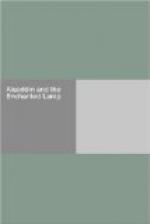(1) x (2) x x (3) x (4) x x (5) x (6) x (7) x (8)
x
x x x x x x x
x x x x x x
x x x x x x x
x x x x x
x x x x
x x x x x x x x
(9) x x (10) x (11) x x (12) x x x x x x x x x x x x x x x x x x
(13) x (14) x x x x x x x x x x x x
(15) x x
x
x x
x x
(16) x
x x
x x
x
[FN#549] Burton adds here, “in order that other than I may carry it off.”
[FN#550] Min el meloum, lit. “[it is] of the known (i.e. that which is known).” Burton, “who knoweth an he wot, etc.”
[FN#551] Night DLXXIV.
[FN#552] Sic, meaning of course that he had discovered its properties and availed himself thereof.
[FN#553] Medinetu ’s seltaneh, i e. the seat of government or capital.
[FN#554] Lit. “donned " (lebesa).
[FN#555] Here Galland says, " Il entra dans le lien le plus fameux et le plus frequente par les personnel de grande distinction, ou l’on s’assembloit pour boire d’une certaine boisson chance qui luy etoit connue des son premier voyage. Il n’y e-t pas plust"t pris place qu’on lay versa de cette boisson dans une tasse et qu’on la luy presenta. En la prenant, comme il prestoit l’oreille ... droite et ... gauche, il entendit qu’on s’entretenoit du palais d’Aladdin.” The Chavis Ms. says, “He entered a coffee-house (kehweh, Syrian for kehawi), and there used to go in thereto all the notables of the city, and he heard a company, all of them engaged in (ammalin bi, a very vulgar expression) talking of the Amir Alaeddin’s palace, etc.” This (or a similar text) is evidently the original of Galland’s translation of this episode and it is probable, therefore, that the French translator inserted the mention “of a certain warm drink"(tea), out of that mistaken desire for local colouring at all costs which has led so many French authors (especially those of our own immediate day) astray. The circumstance was apparently evolved (alla tedesca) from his inner consciousness, as, although China is a favourite location with the authors of the Nights, we find no single mention of or allusion to tea in the rest of the work.
[FN#556] Lit. “I will make him lose.”
[FN#557] Night DLXXV.
[FN#558] Lit. “Instruments of astronomy or astrology” (tenjim); but tenjim is also used in the sense of geomancy, in which operation, as before explained, astrology plays an important part, and the context shows that the word is here intended to bear this meaning. Again, the implements of a geomancer of the higher order would include certain astrological instruments, such as an astrolabe, star-table, etc., necessary, as I have before explained, for the elucidation of the scheme obtained by the sand-smiting proper.




